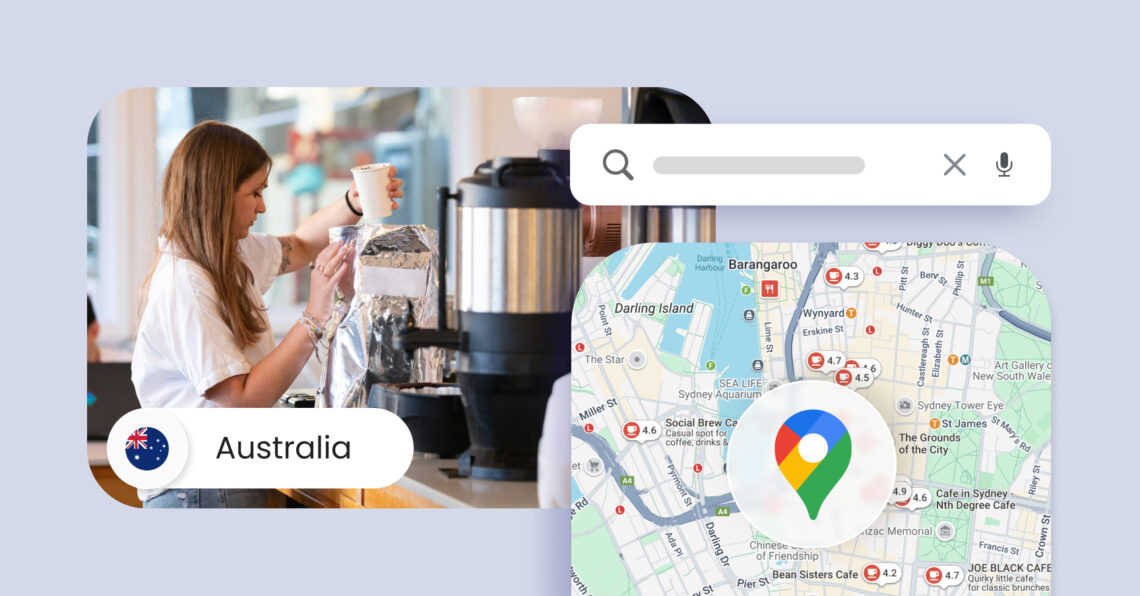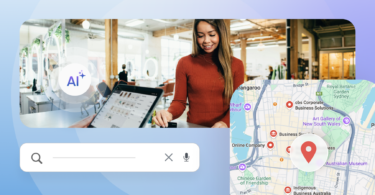SEO for small business in Australia is your shortcut to getting found by more local customers, without blowing the entire marketing budget. Think of it as the tool that brings you real, ready-to-buy website visitors while big brands overspend on plain old paid advertising.
Unlike a one-off ad, investing in smart digital marketing and SEO services for a small business means you attract high-quality organic traffic month after month, and keep growing, even on a modest budget.
The best SEO strategy for small businesses is about targeting the right people nearby, getting your business higher up in Google’s search results, and converting those online clicks into real-life sales.
The good news? You don’t need a huge budget to make an impact.
In this blog, we’ll break down everything you need to know to make SEO for small businesses in Australia work in 2026.
Table of contents
- Why SEO matters for small businesses in Australia
- How SEO works for small businesses in Australia
- What makes small business SEO in Australia different
- Common SEO mistakes Australian small business owners make (and how to fix them)
- Tailored SEO strategies that help small businesses succeed
- How a small business protected its brand and improved local SEO with Birdeye
- Should you do SEO yourself or hire a local agency
- What to expect from small business SEO packages in Australia
- How to measure the results of your SEO efforts
- SEO trends for small businesses in Australia in 2026
- Frequently asked questions on SEO for small business in Australia
- How Birdeye helps Australian businesses with local SEO
Why SEO matters for small businesses in Australia
If you’re running a business, you’ve probably wondered how to reach more local customers without blowing your marketing budget or wasting money on paid advertising. The answer is simple: smart SEO for small business Australia helps you show up when people are searching for “best café near me” or “local plumber.” That means you increase your organic traffic by showing up when people are ready to buy.
Here’s a closer look at why SEO is worth paying attention to:
1. Better online visibility
Good SEO helps your website appear higher in search engine results. More people will visit your website when your business is easier to find. This gives you more chances to connect with new customers.
2. Reaches the right people
SEO helps attract people who are already looking for what your business offers. By using the right keywords and focusing on what your customers are searching for, you can attract visitors who are more likely to purchase or get in touch.
3. Supports sales and business growth
More website visibility and the right kind of website traffic can lead to more sales. A strong SEO setup also helps your business appear more reliable, encouraging people to choose you over a competitor.
4. Affordable marketing option
Compared to paid ads, SEO is more affordable in the long run. Once your website is properly set up and optimized, it can keep bringing in visitors without needing to spend money every day.
5. Helps with local customers
If your business serves a local area, local SEO is especially useful. It helps your business show up in local searches and maps, which is great for bringing in people nearby who are ready to buy or visit.
6. Builds trust and credibility
When your website appears near the top of search results, it sends a message that your business is trustworthy and relevant. This helps build confidence with potential customers.
7. Long-term benefits
Unlike ads that stop working when your budget runs out, SEO can continue to bring in results over time. A solid SEO setup can keep working in the background, helping your business grow steadily.
Now that we’ve covered why SEO is essential, let’s explore what actually works in 2026—and how small businesses in Australia can stay ahead.
How SEO works for small businesses in Australia
SEO helps small businesses in Australia improve how their websites appear in search engines like Google. This is done through strategies that improve your site’s relevance, structure, and authority online.
Here’s how the process works:
1. Keyword research
This is the starting point of any small business SEO strategy. It involves finding your potential customers’ words and phrases when looking for your products or services.
The focus is on choosing relevant keywords relevant to your business and offering a good balance between their frequency of search and their competitiveness.
2. Content optimisation
Once you have your keywords, the next step is to update your website content to match what people are searching for. This includes editing page titles, headings, descriptions, and the main body content to naturally include your chosen keywords.
It is also important to create useful, well-written content that answers common questions and helps your visitors. Adding images, videos, or other media can make the content more engaging. Search engines now also look at how helpful and user-friendly your content is, so formatting, layout, and clear answers matter.
3. Link building
Link building involves getting other reputable websites to link to yours. These backlinks show search engines that your site is trustworthy. You can earn links by collaborating with local businesses, writing guest articles, or getting listed in directories or industry blogs. Strong links from quality sources can significantly improve your visibility in search results.
4. Technical SEO
Technical SEO focuses on how well your website runs behind the scenes. It includes things like:
- Making sure your site loads quickly
- Ensuring it works well on mobile devices
- Using secure HTTPS connections
- Having a clear site structure so search engines can crawl and index your pages properly
Sitemaps and robots.txt files guide search engines as they go through your website.
5. Local SEO for Australian businesses
If your business serves a specific area, local SEO is important. This includes updating your Google Business Profile with accurate business details, hours, and location.
Encourage happy customers to leave reviews and ensure your business is listed in local directories or online maps. This will help your business appear when people search for your products/services near you.
6. Ongoing monitoring and updates
SEO isn’t a one-time job. It’s important to keep track of how your website is performing. Tools like Google Analytics and Google Search Console help you see what’s working and what needs improvement.
SEO trends and search engine algorithms change over time, so staying updated and adjusting your approach is key to long-term success.
But SEO isn’t one-size-fits-all, especially in a country as diverse and geographically spread out as Australia. In the next section, we’ll examine what makes SEO for Australian small businesses unique and how to tailor your approach for better local results.
What makes small business SEO in Australia different
SEO for small businesses in Australia is tailored to help businesses stand out locally. Instead of reaching out to a global audience, the goal is to connect with Australian customers in specific areas, using language and proven SEO strategies that are relevant to them.
1. Focus on local search
Attracting customers from nearby suburbs or towns is essential for many small businesses.
For example, a “plumber in Sydney” or “best café in Melbourne” needs to rank for those location-specific keywords on Google to appear in local map packs and “near me” searches.
2. Update and optimise your Google Business Profile
Accurate GMB listing optimisation with consistent NAP (name, address, phone number) across your business listings is crucial for local SEO.
If a café in Brisbane lists different contact information on their website, Google My Business, and Yelp, it could confuse potential customers and impact search rankings. Additionally, keeping your Google Business Profile updated with accurate hours, photos, and Google reviews helps businesses appear in local search results and map results, building customer trust.
3. Connection with the local community
Being engaged in your local community goes beyond just online presence.
For instance, a boutique in Byron Bay might create content about the local markets, or a landscaping business in Perth could sponsor a local sports team. This connects with the community and boosts search engine visibility through content that people in the area care about.
4. Mobile-first experience
A quick point about how most local searches in Australia happen on mobile. So, ensuring a fast, mobile-friendly site design is vital for a seamless customer experience.
5. Regional language and user intent
Australians use specific terms, spellings, and slang that may differ from those in other English-speaking countries.
For instance, Australians spell “realise” with an “s,” and in places like Melbourne, locals often refer to “footpaths” instead of “sidewalks.” Optimising for local language, like using “holiday parks” instead of “campgrounds” in Queensland, can better match how people search.
With those specifics in mind, it’s equally important to avoid mistakes that can hold your business back online.
Common SEO mistakes Australian small business owners make (and how to fix them)
Many small business owners unknowingly make local SEO mistakes. Avoiding these pitfalls can dramatically improve your visibility.
Using the wrong keywords or ignoring keyword research
Targeting vague or highly competitive keywords often leads to frustration. Instead, aim for long-tail keywords like “family dentist in Newcastle” that reflect how real people search.
Failing to optimise for mobile devices
Most Australians browse on mobile, so your website must be responsive, load fast, and be easy to navigate on smaller screens.
Neglecting local SEO opportunities
Not claiming your Google Business Profile, skipping directory listings, or ignoring reviews can cost you valuable local traffic.
Missing or thin content
Having too few pages or not enough useful information can hurt your rankings. Ensure your site includes dedicated pages for each service or product, especially with local context.
Not keeping your website and SEO fresh
SEO isn’t a one-time fix. Many businesses launch a website and never update it. Regularly refreshing content, updating keywords, and checking performance is key to staying visible.
Now that you know what to avoid, let’s explore what strategies you can put in place that work.
Boost Visibility with SEO for Small Business Australia
Want to see the impact of Birdeye on your business? Watch the Free Demo Now.
Tailored SEO strategies that help small businesses succeed
You don’t need to do everything simultaneously, but focusing on a few solid strategies can build strong momentum over time.
Choose keywords that reflect what your customers search
Start with terms that reflect buying intent. Use tools like Ubersuggest or Google Keyword Planner to find keyword ideas specific to your services and locations.
Optimise for your local area and suburbs
If you serve multiple suburbs, create location-based landing pages (e.g., “roofing services in Parramatta”) to target searchers in each area.
Publish helpful and relevant content
Answer customers’ common questions, share local updates, or write guides specific to your industry. This builds trust and increases keyword coverage.
Ensure your website is fast, secure, and mobile-friendly
A slow or hard-to-use website frustrates users and reduces your chances of ranking. Use free tools like GTmetrix and Google PageSpeed Insights to test the website’s performance.
Earn backlinks and community mentions
Reach out to local blogs, join Australian business directories, and collaborate with others in your niche to earn backlinks and brand exposure.
These strategies build the foundation for your SEO journey. But the question remains: Should you handle this yourself or get the help of small business SEO specialists?
How a small business protected its brand and improved local SEO with Birdeye
HEB Plumbing and Sprinkler, a small business in a competitive market, was losing customers due to confusion caused by other companies using similar names. By using Birdeye’s review and listing management tools, the business increased positive reviews, ensured consistent listings across directories, and improved its local search visibility.
This strengthened brand trust and brought more traffic from Google to its storefront. Australian businesses facing similar challenges can use the same approach to improve their online presence and attract more local customers.
Should you do SEO yourself or hire a local agency
There’s no one-size-fits-all answer, but each option has pros and cons depending on your goals and resources.
When DIY SEO might be the right fit
If you have time to learn, a limited budget, and a basic website, you can make great progress using SEO plugins and free resources.
When to consider hiring an SEO expert in Australia
If your market is competitive or your website has technical issues, a small business SEO agency can provide professional insights, faster results, and a long-term strategy.
Whether you DIY or hire, knowing what to expect in an SEO package helps ensure you get value for your money.
What to expect from small business SEO packages in Australia
Not all SEO services are created equal. Look for transparent, tailored solutions based on your industry and goals.
Affordable SEO services that should be included
- Website audit
- Competitor analysis
- Keyword strategy
- On-page optimisation
- Technical fixes
- Local SEO setup
- Monthly reporting
Questions to ask your SEO provider
- What tools do you use?
- Can I see case studies or results from similar businesses?
- How will we track performance?
After setting up your SEO, tracking your progress and optimising is critical to see what’s working.
How to measure the results of your SEO efforts
Knowing what metrics to look for helps you make smart decisions and improve ROI.
The most important SEO performance indicators
- Organic search results
- Google rankings for key terms
- Google Business Profile insights
- Click-through rates (CTR)
- Phone calls, contact form submissions, and other conversions
Useful tools for tracking progress
Use Google Search Console to see keyword performance, and Google Analytics to understand how users interact with your site. Platforms like SEMrush can also provide detailed SEO insights.
Looking at the numbers is useful, but nothing beats seeing real-world results from Aussie businesses like yours.
SEO trends for small businesses in Australia in 2026
SEO is always changing, and in 2026, there are several key developments that small businesses in Australia should be aware of. Here are a few listed below:
1. AI-driven SEO tools and automation
Artificial intelligence is becoming integral to SEO strategies, helping small businesses automate content creation, keyword targeting, and performance reporting tasks.
In Australia, businesses increasingly use AI-powered tools to streamline SEO efforts and gain deeper insights into customer behavior and search patterns. These tools can also help enhance local SEO by providing tailored keyword suggestions and content strategies that resonate with the local audience.
2. Voice search and conversational queries
As voice-activated search increases with Google Assistant, Siri, and Alexa, Australian businesses must adapt to voice queries.
Local search terms are growing more conversational, with Australians frequently using natural phrases like “Where’s the best pizza place in Perth?” Businesses that adapt their content to match everyday speech patterns and focus on local terms are more likely to appear in these search results.
3. User experience as a ranking factor
Search engines are placing increasing importance on user experience (UX) as a ranking factor. This includes how fast your site loads, whether it works on mobile devices, and how it’s structured.
Small businesses should ensure their websites are responsive, optimized for speed, and structured to enhance user engagement. Regularly reviewing your website’s performance and ensuring it’s easy to use across all devices will help improve search rankings and overall customer satisfaction.
4. AI overviews now lead search results
Google now uses AI-generated overviews instead of featured snippets at the top of results. These summaries pull info from multiple trusted sources. To be included, your content must be accurate, clear, and aligned with user intent. Quality and structure matter more than ever.
In 2026, small business SEO in Australia will be shaped by smarter tools, changing search habits, and a bigger focus on user-friendly websites. Adapting to these updates, by reviewing your site, using AI tools wisely, and keeping your content relevant, can help your business stay competitive in search.
Frequently asked questions on SEO for small business in Australia
Local SEO means optimising your website and online presence so your business appears in local search results for customers nearby. This boosts local visibility, drives relevant traffic, and increases calls or store visits from your area.
Most small businesses see results in 3–6 months, depending on your industry and local competition in your area.
It targets searches with Aussie terms, suburbs, and slang, like “best tradie in Brisbane” or “café near me in Melbourne.”
If you have time, DIY is possible. But a local expert understands Aussie search trends and can get faster, location-specific results.
A complete, regularly updated Google Business Profile is critical. It helps your business appear in Google Maps and local search packs, improves credibility, and directly impacts your ranking for location-based searches in Australia.
Focus on reputable directories like Yellow Pages, TrueLocal, Hotfrog, StartLocal, and LocalSearch. Accurate, consistent business details in these listings build local authority and support Google rankings.
No, you don’t need to display your physical address. Instead, set your service areas in your Google Business Profile to show where you operate. This maintains your privacy while keeping you visible in relevant searches.
Typical mistakes include neglecting Google Business Profile, using the wrong keywords, lacking local citations, slow mobile sites, and not responding to reviews. Birdeye helps avoid these by managing reviews, listings, and customer engagement in one platform.
Use conversational phrases and FAQs, target local language and slang, and be concise. Ensure your business info and content answer typical “near me” and question-based searches for the best results.
Birdeye supports your SEO by automating review collection, keeping local listings accurate, and providing analytics to measure local performance. This makes it easier to manage and grow your visibility across Australia.
How Birdeye helps Australian businesses with local SEO
Birdeye is built to help Aussie small businesses grow by making local SEO simple and effective. Whether you run a clinic in Perth or a café in Sydney, Birdeye enables you to get found when locals search for services like yours.
Here’s how Birdeye supports local SEO success across Australia:
- Boosts your Google visibility: Automatically updates and manages your Google Business Profile so you appear in maps and local “near me” searches.
- Gathers and showcases customer reviews: Birdeye’s Reviews AI makes it easy to collect reviews from happy Aussie customers and display them across Google, Facebook, and industry directories.
- Manages listings across the web: Birdeye Listings AI ensures your business info is consistent across key Australian directories like Yellow Pages, TrueLocal, and more.
- Tracks performance with real results: See how many calls, clicks, and visits your search engine optimisation efforts drive, backed by simple, transparent reporting.
- Supports multi-location businesses: If you have shops or offices in different suburbs or cities, Birdeye helps each one rank well locally.
From tradies and clinics to boutiques and restaurants, Birdeye gives small business SEO services in Australia the tools they need to appear in local search rankings and turn views into customers.

Originally published









